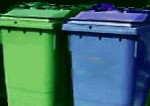 |  |
|
Talk big, ignore the details Local politicians and officials are forever sticking a hand in the taxpayer's pocket and sounding off about how much they're doing to save the planet. Recycling is their lastest major scam. Recycling is the big cash cow of the moment. It lets councils charge Council Taxpayers for weekly refuse collections while actually providing "alternate weekly", a.k.a. fortnightly, collections. It is also seen as the way ahead for imposing charges in top of the Council Tax for 'extra environmental services' of doubtful value.
A great many councils just hand over the separated materials to contractors, after handing over a big chunk of Council Taxpayers' money, and ask no questions about where everything goes and how the contractor disposes of any unrecoverable components. Why? Because the government has failed to give them the power to demand answers from contractors. Anyone who puts the wrong type of rubbish in a recycling bin Once the refuse is off the council's hands, it sends a report to the government, which then cobbles together bogus statistics, which are used to further the myth that the European Union is recycling more and more, and to avoid EU fines for failing to meet its arbitrary targets.
And nobody knows how much is actually re-used and how much disappears from sight in some far-off place. The government says it is on course to hit all of the EU's targets for recycling, but that applies only to domestic refuse. It has nothing to say on the subject of commercial and industrial refuse. |
 |  |
 Now, questions are being asked about what actually happens to all the bottles and cans and bits of plastic, which are separated out of household refuse into a range of different coloured bins and plastic sacks. The simple answer is that 45% of local councils either don't know or won't say, a survey by the Local Government Association has found.
Now, questions are being asked about what actually happens to all the bottles and cans and bits of plastic, which are separated out of household refuse into a range of different coloured bins and plastic sacks. The simple answer is that 45% of local councils either don't know or won't say, a survey by the Local Government Association has found.
 So what does happen to a lot of the nation's recycled materials? Some of it actually does return to use in new products. But some councils have been quietly shoving it in landfill sites, of which this country always has a lot. And others use contractors which ship it to Azerbaijan, China, Ghana, Guinea, Libya, Turkey, Vietnam and other parts of the Third World, where it can be recycled or just dumped.
So what does happen to a lot of the nation's recycled materials? Some of it actually does return to use in new products. But some councils have been quietly shoving it in landfill sites, of which this country always has a lot. And others use contractors which ship it to Azerbaijan, China, Ghana, Guinea, Libya, Turkey, Vietnam and other parts of the Third World, where it can be recycled or just dumped.